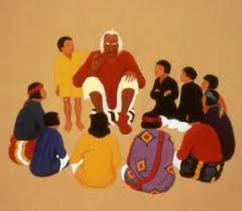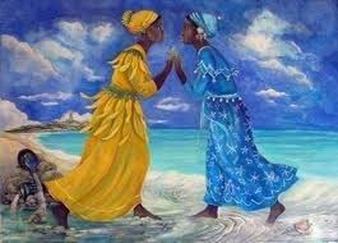Patakis and Proverbs

Sacred stories are universal
The sacred stories of Santería are known as patakis (pronounced: pah-tah-KEES). They have been passed down orally from generation to generation for thousands of years, sometimes undergoing subtle transformations over time due to varying interpretative skills on the part of the storyteller, and sometimes due to linguistic and cultural shifts caused by migration to new lands. The patakis recited in Spanish today by members of a particular ilé (religious house) in Cuba may differ from the way the stories are told in a neighboring ilé. They will certainly vary from the way the stories are told in Yoruba in a village in Africa, or the way they're related in English for people born and raised in the United States. But the essential structure and message of the patakis remains the same, and all are recognized as part of the sacred body of literature that's the backbone of Santería.
Traditionally, specific patakis are attached to specific odu, which are the letters or signs that appear during divination with the dilogún (cowrie shells) or the Babalawo's epuele (divining chain). When a client sees a Santero/a or Babalawo for a consulta (reading), the odu that appears on the mat must be interpreted to help the client understand and resolve his problem. Because the information doesn't exist in a codified written form, such as a holy book. the diviners have to memorize as much information as possible about each odu. Interpretive skill is required to coax out the subtle and complex messages of each odu as it relates to the client's situation. The patakis attached to the odu help the diviner remember and understand more profoundly the messages of the odu because they function as parables, stories with symbolic and metaphorical meaning much deeper than surface appearances. It's unclear how many patakis exist because there's no single collection that holds them all, and no individual diviner can claim to know all the patakis, no matter how much he or she has studied. The goal of a skilled diviner is to learn as many patakis as possible, to understand how they relate to the odu, and to be able to retell the pataki in a meaningful way, so the client will understand how it applies to his or her life.
Traditionally, specific patakis are attached to specific odu, which are the letters or signs that appear during divination with the dilogún (cowrie shells) or the Babalawo's epuele (divining chain). When a client sees a Santero/a or Babalawo for a consulta (reading), the odu that appears on the mat must be interpreted to help the client understand and resolve his problem. Because the information doesn't exist in a codified written form, such as a holy book. the diviners have to memorize as much information as possible about each odu. Interpretive skill is required to coax out the subtle and complex messages of each odu as it relates to the client's situation. The patakis attached to the odu help the diviner remember and understand more profoundly the messages of the odu because they function as parables, stories with symbolic and metaphorical meaning much deeper than surface appearances. It's unclear how many patakis exist because there's no single collection that holds them all, and no individual diviner can claim to know all the patakis, no matter how much he or she has studied. The goal of a skilled diviner is to learn as many patakis as possible, to understand how they relate to the odu, and to be able to retell the pataki in a meaningful way, so the client will understand how it applies to his or her life.
Patakis Teach Us the Principles of Santería as a Religion

Patakis tell stories about the Orichás
Patakis often tell stories about the Orichás, and help define characteristics and traits associated with each one. They speak about the Orichás' lives on earth, their interactions with each other and with humans, their relationship to God (usually in the form of Olofi), and they explain some fundamental principles of the religion, such as the association of particular elements of the natural world (rivers, oceans, mountains, volcanoes, forests, thunder and lightening, etc.) with particular Orichás. They explain the preference for certain kinds of foods that each Orichá has (pumpkins for Ochún, for example). They explain where particular customs come from, such as the need to begin all ceremonies by addressing Eleguá first. Some patakis talk about the creation of the cosmos, and explain decisions made by Olodumare about the nature of human life, such as the reason sickness and death exist. The odu (signs, letters used in divination) are also personified in some of the patakis, making it clear why certain odu are associated with certain phenomenon, such as slander, gossip, adultery, or domestic violence. They also explain, through example, what kind of ebó (tribute, offering) might be appropriate to solve the problem. In sum, patakis teach the religion to people through stories and examples in short episodes that lend themselves to deeper reflection and thought. Because the patakis speak through symbols and metaphors, they require a bit of work to interpret correctly, keeping in mind always the historical, social and cultural context of the Yoruba/ Lucumí people.
Patakis as Folklore

Written texts don't replace the oral tradition
Recently, some people have started to write patakis down and publish them as collections of stories. These collections are good for people who are interested in learning about the patakis in a general way, and they help preserve an oral tradition that has become somewhat dispersed due to migration/ immigration in the modern world. However, they don't take the place of the traditional oral method of transmission. It is always better, whenever possible to work directly with elder Santeros/as and Babalawos who teach the patakis to their godchildren as they were developed in that particular rama (branch of the religion). In theory, individual patakis can stand alone as folk narratives, stories to be repeated at random for enjoyment or general moral education. But, it's important to remember that they are above all sacred texts, because they contain the wisdom and teachings of God.
Patakis are not, technically speaking, secret knowledge. Anyone can learn patakis and retell the stories. However, in order to grasp the full meaning of the story and all of its implications, the storyteller needs to be well trained in interpreting odu, which is a skill not available to the general public. Only fully initiated priests and priestesses can read the dilogún, and only Babalawos can work with the epuele chain. Dilogún interpretation requires years of study, and not all Santeros/as have the aché (energy) for that kind of work. Therefore, the ones who are most skilled at using patakis are people who have spent many years studying odu, and who understand the connection between the odu and the patakis. In Cuba, most Babalawos are expected to learn as many patakis as possible, since they are considered specialists in divination. The knowledge of patakis among Santeros/as is optional in most communities. Most practitioners of Santería will know some familiar stories, but may not know the relationship between the pataki and the odu.
Patakis are not, technically speaking, secret knowledge. Anyone can learn patakis and retell the stories. However, in order to grasp the full meaning of the story and all of its implications, the storyteller needs to be well trained in interpreting odu, which is a skill not available to the general public. Only fully initiated priests and priestesses can read the dilogún, and only Babalawos can work with the epuele chain. Dilogún interpretation requires years of study, and not all Santeros/as have the aché (energy) for that kind of work. Therefore, the ones who are most skilled at using patakis are people who have spent many years studying odu, and who understand the connection between the odu and the patakis. In Cuba, most Babalawos are expected to learn as many patakis as possible, since they are considered specialists in divination. The knowledge of patakis among Santeros/as is optional in most communities. Most practitioners of Santería will know some familiar stories, but may not know the relationship between the pataki and the odu.
